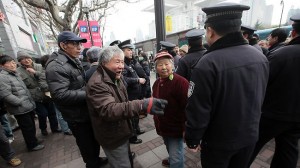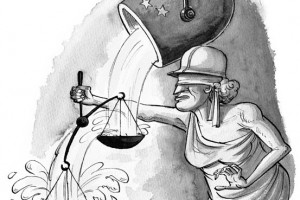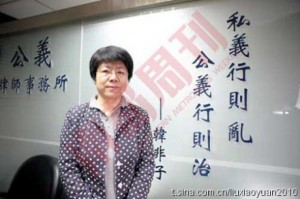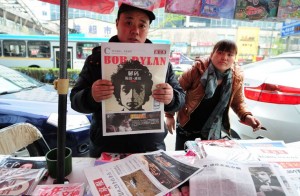Don Clarke & Li Tiantian: Two Takes on the Jasmine Revolution in China
In February 2011, the Chinese government began a quick and widespread crackdown on Chinese rights-defending (“weiquan”) lawyers and activists, abducting many for days to months on end, some subject to torture while in government custody. The general narrative that has emerged to explain this recent crackdown is the Chinese government’s fear that an Egypt-like democratic revolution could occur in China, overturning the Chinese Communist Party’s one-party rule.
Make no mistake these extrajudicial abductions are not permissible under Chinese criminal law and like other countries, there are laws in China that restrict the government. Under Chinese Criminal Procedure Law (“CPL”), a detention warrant issued by a public security organ must be presented when an individual is taken into custody (CPL Art. 64); either the family members or the employer of the detained individual must be informed of the reasons for the detention within 24 hours (CPL Art. 64); the first interrogation of the detained person must be conducted within the first 24 hours (CPL Art. 65); after the first interrogation, the detained person has the right to retain a lawyer and the lawyer has a right to meet with his or her client (CPL Art. 96 – note that this provision makes it legal for the first interrogation to be conducted without a lawyer present); and after 37 days in custody, the detained individual must either be arrested or released (CPL Art. 69). Additionally, Article 238 of the Chinese Criminal Law criminalizes any unlawful detention or deprivation of personal liberty, imposing a harsher criminal sanction on state functionaries.
So the question remains, if the Chinese government just flouts these laws, why does it bother?
And what does this say about its progression toward a rule of law, a progression the Chinese government maintains is its goal?
Prof. Donald Clarke of George Washington University Law School came out with a rather thought-provoking essay last Thursday, seeking to answer some of these questions, and put China’s ‘rule of law’ development in some sort of perspective. In “China’s Jasmine Crackdown and the Legal System,” Prof. Clarke dispenses with the conventional idea that China was ever on the path toward a rule of law. Defining a rule of law as a system “where there are meaningful restraints on the powers of government” and that “those in power cannot do simply as they please,” Prof. Clarke maintains that the Chinese government never had the intention to be held accountable; its quest toward a “rule of law” for the past 30-odd years has just been about creating government efficiencies. In 1978, to become a successful market economy, the Chinese leadership had to create some legal system since Mao had all but dispensed with law by the end of the Cultural Revolution (1966-1976). But while these developments in the economic-legal sphere might have the looks of a rule of law, scholars are wrong to think that it was ever the government’s intention to be held accountable under a true rule of law system. Many of the Chinese government’s recent actions, including the crackdown on rights-defending lawyers, exemplify the leadership’s anti-commitment to a rule of law.
There is something to be said for Prof. Clarke’s assessment and in many ways it is accurate: the leadership appears unwilling to allow anything it deems “political” to be handled by the legal system and this appears to explain its harsh assault the past few years on rights-defending lawyers. It’s commitment to a “rule of law,” a commitment it repeatedly states in various US-China dialogues, seems specious if it does not allow a space for rights-defending lawyers. But Prof. Clarke’s analysis is very top-down and doesn’t take into effect the rights-defending lawyers themselves. And this is where the other fascinating essay from last Thursday comes into play, Li Tiantian’s blog post “I was Discharged from the Hospital” (translation courtesy of Siweiliozi’s Blog). Li Tiantian is a Shanghai-based rights-defending lawyer, taken into custody on February 19, 2011 and held incommunicado for three months, finally released on May 24, 2011. In a highly allegorical essay, Li Tiantian recounts her captivity:
It’s been a while since I’ve been in touch. First, let me tell you a story.
One day, a hornet worried unreasonably that a little bird would stir up its nest. (As it happened, some distant hornet nests had recently been stirred up.) The hornet grabbed the little bird and began stinging it frenziedly. Unable to bear the hornet’s stings and thinking there was no point to suffering this ordeal, the bird realized that no one would gain anything and that there was no way to change the hornet’s ways. So, the bird kneeled down to the hornet and kowtowed in order to extricate itself. The hornet, knowing that the force of justice was on the increase in the animal world, didn’t dare do anything rash to the bird and came up with a plan that would satisfy everyone. It agreed to release the little bird, but only if the bird promised: (1) not to speak of the past few months; (2) not to damage the hornet’s reputation; and (3) not to urge other animals to stir up the hornet’s nest. Finally the bird was free. (…read more here…)
Li Tiantian’s publication of this blog post soon after her release belies her commitment to any kind of silence concerning her unlawful detention. The fact that her blog post was pulled – likely by the Chinese government – a few days later is not surprising. But her brazenness is. After three months in custody, unable to communicate to the outside world, and subject to heaven’s knows what, Li still feels the need to speak; still feels the need to give push back to the government.
Prof. Clarke presents a government that doesn’t want to give people like Li Tiantian any space; but Li Tiantian has no plans to give up that easily. True that since many of the lawyers’ release, most have kept out of the spotlight, but will they continue to do so? And how can the Chinese government expect them to?
Prof. Clarke is right to contend that the Chinese Communist Party is not interested in a “rule of law” if it means that it will contain the Party. But after 30 years of constantly reiterating – both domestically and abroad – the idea of a rule of law, sending lawyers, judges, and academics abroad to study Western countries’ legal systems, and inviting various foreign legal NGOs to establish offices in China and work with Chinese layers, some belief in a rule of law must have permeated society, especially for academics and rights-defending lawyers, the beneficiaries of much of China’s rule of law programs.
Prof. Clarke compares the Chinese government to a well organized army: sure there are lots of bureaucratic rules that must be followed, but those rules are not intended to be followed by the commander. For Prof. Clarke, an army, with all the rules that help it function, is in no way a rule of law society.
But running a society is different from running an army; unquestionable allegiance to hierarchy is not naturally found in society like it is among foot soldiers in an army. Ultimately, Prof. Clarke’s essay raises another question: while the Chinese government has little interest in rule of law, will these rights-defending lawyers succumb and just disappear? Li Tiantian’s essay upon her release heavily implies that the answer is no and that among some in China, there is a true commitment to a greater rule of law, even if not found within the ruling party.
 On Facebook
On Facebook By Email
By Email 



